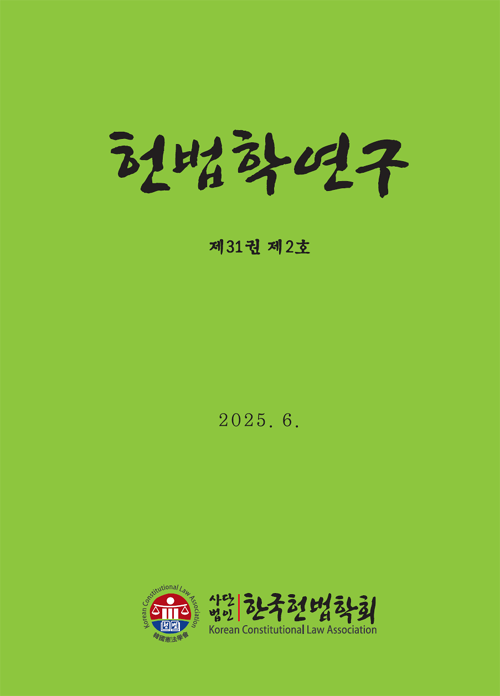학술논문
AI 디지털교과서 도입의 법정책은 헌법상 교육을 받을 권리에 부합하는가? - 신민영화 교육정책과 기술결정론이 헌법적 가치에 미치는 부정적 영향에 관하여
이용수 104
- 영문명
- Is the constitutional right to education upheld by the legal policy of incorporating AI digital textbooks?
- 발행기관
- 한국헌법학회
- 저자명
- 최정호(Jeong Ho CHOI)
- 간행물 정보
- 『헌법학연구』第31卷 第2號, 345~389쪽, 전체 45쪽
- 주제분류
- 법학 > 법학
- 파일형태
- 발행일자
- 2025.06.30
8,200원
구매일시로부터 72시간 이내에 다운로드 가능합니다.
이 학술논문 정보는 (주)교보문고와 각 발행기관 사이에 저작물 이용 계약이 체결된 것으로, 교보문고를 통해 제공되고 있습니다.

국문 초록
AI 디지털교과서(이하 ‘AIDT’)란 2025학년도 1학기에 교육부가 도입한 학습 및 교육 지원 소프트웨어를 말한다. 이 연구는 AIDT 도입 과정에서 헌법 제33조가 규정한 능력에 따라 균등하게 교육을 받을 권리가 기술기업의 ‘린 앤 애자일’ 전략과 정부의 기술결정론적 낙관에 기초한 법정책에 의해 실현되지 못하는 모습을 보여주려 한다. 구체적인 내용은 다음과 같다. 첫째, 맞춤형 교육이라는 이상이 학습자의 ‘능력’으로서 소질과 적성을 계발하기보다는, 기존의 입시 위주 교육을 통한 교육제도 오작동에 자양분을 제공한다. 둘째, AIDT가 문제 풀이를 통해 교육격차를 해소하는 데 도움을 준다면 교육을 받을 권리를 실현하는 측면이 있겠지만, 아직 충분한 기술이 갖춰지지 않았다. 셋째, 이상의 한계가 보여주듯 잘못된 정책 추진으로 인해 오히려 장애인 학생을 차별하고 배제하는 상황을 심화했다. 넷째, AIDT의 구현은 엔지니어와 기술기업의 결정이 누적되어 이루어지는데, 이런 점에서 교사는 수업에서 주도성을 잃게 되고, 그것이 교사 등 학교 공동체가 아니라 정부의 일방적 정책 추진의 결과라는 점에서 교육의 자주성과 전문성에 부정적 영향을 미친다. 다섯째, 공개성과 이익조정가능성이 담보되는 국회의 입법과정이 아니라 정부입법을 통해 일방적으로 AIDT를 도입한 것은 교과서제도 법정주의에 위반되어 위헌적이다. 이어서 이상의 문제들은 AIDT를 기술적으로 개선하면 도입이 되는지 보다는 기술의 도입과 확산 과정에서 교육 영역의 헌법적으로 고유한 가치 결단에 중점을 두고 해결해 나가야 한다는 점을 지적했다. 기술기업이 영리 추구를 위한 속도전을 펼칠 때 국가는 국민의 기본권보호의무를 이행해야 하며, 신기술의 확산 그자체가 아니라 교육적으로 필요한 적정기술을 추구해야 함을 주장한다. 여전히 혼돈의 가운데 있는 AIDT를 비판적으로 성찰하는 이 연구를 통해 그동안의 교육정책과 AI 정책에서 무시되어 온 헌법의 가치를 다시 새기고 실천할 수 있기를 희망한다.
영문 초록
The Ministry of Education introduced AI Digital Textbook (AIDT) in the first semester of the 2025 school year as a learning and education support software. The objective of this study is to demonstrate that the right to equal education in accordance with the capacity outlined in Article 33 of the Constitution is not being realized during the implementation of AIDT as a result of the government's legal policy, which is based on technological deterministic optimism, and the lean and agile strategy of technology companies. The following are the specific contents. Initially, the concept of personalized education contributes to the education system's dysfunction by utilizing the current entrance exam-oriented approach to education, rather than fostering the learner's proclivity and talent as “capabilities.” Secondly, AIDT may realize the right to receive education if it assists in the elimination of the education divide through problem-solving; however, the necessary technology is not yet available. Third, the implementation of the incorrect policy has led to the exclusion and discrimination of students with disabilities, as evidenced by the aforementioned limitations. Fourth, the implementation of AIDT is the result of the government's unilateral policy promotion, rather than the school community including teachers, which results in the loss of teachers' initiative in the classroom. This has a negative impact on the autonomy and professionalism of education. Fifth, the unconstitutionality of the introduction of AIDT unilaterally through government legislation, rather than through the legislative process of the National Assembly, which ensures openness and the potential for profit coordination, is a violation of the principle of legality in the textbook system. Furthermore, it was noted that the aforementioned issues should be resolved by concentrating on the identification of the Constitution's inherent values in the field of education during the introduction and dissemination of technology, rather than determining whether AIDT can be introduced by technically enhancing it. It is contended that the state should fulfill its obligation to safeguard the fundamental rights of the populace by pursuing appropriate technology for education, rather than the diffusion of new technology, when technology companies engage in a speed war to pursue profit. We aspire to re-establish and implement the principles of the Constitution that have been disregarded in education and AI policies thus far by this study, which critically examines AIDT, which is currently mired in confusion.
목차
Ⅰ. 서론
Ⅱ. AI 디지털교과서 도입을 위한 법정책의 전개
Ⅲ. 헌법상 교육을 받을 권리 실현에서의 문제
Ⅳ. 헌법이 추구하는 교육 문제로서 AIDT
Ⅴ. 결론
참고문헌
키워드
해당간행물 수록 논문
- [번역] 제국헌법에 있어서 비스마르크의 유산
- 언론·출판의 허가 및 검열금지의 개시통제로서의 진정한 의미와 현행 「방송법」의 위헌성 - 헌재 2001. 5. 31. 2000헌바43, 52(병합) 결정의 평석
- 권력구조 개헌론 - 87년 헌법의 한계 극복을 위한 헌법개정의 방향
- 우리나라의 인공지능 기본법 제정에 따른 법적 과제
- 국정감사·조사에서 증인 소환 및 조사의 문제점
- 대통령의 형사상 특권의 적용범위에 관한 검토 - 헌법개정의 관점에서
- 무면허 의료행위에 관한 헌법적 쟁점 - 이른바 대체의학 사건의 헌법재판소 결정을 중심으로
- 휴머노이드 로봇에 관한 헌법적 고찰 - 헌법적 쟁점 및 규율·지원 체계에 관한 시론(試論)
- AI 디지털교과서 도입의 법정책은 헌법상 교육을 받을 권리에 부합하는가? - 신민영화 교육정책과 기술결정론이 헌법적 가치에 미치는 부정적 영향에 관하여
- 대통령제에서 여소야대의 구조적 갈등과 헌정체제 개혁 방안
- 헌법상 “정치적 중립성”의 의미·심사기준·구체적 적용에 관한 연구 - 12·3 계엄을 비판한 공무원의 표현행위를 글감으로 삼아서
참고문헌
교보eBook 첫 방문을 환영 합니다!

신규가입 혜택 지급이 완료 되었습니다.
바로 사용 가능한 교보e캐시 1,000원 (유효기간 7일)
지금 바로 교보eBook의 다양한 콘텐츠를 이용해 보세요!



